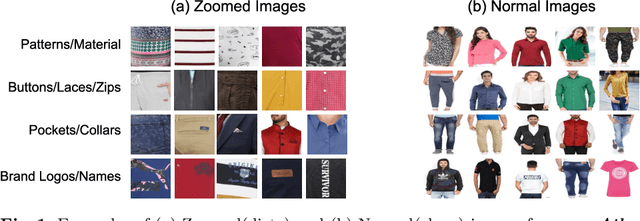Girish Shanmugam S
Atlas: A Dataset and Benchmark for E-commerce Clothing Product Categorization
Aug 12, 2019



Abstract:In E-commerce, it is a common practice to organize the product catalog using product taxonomy. This enables the buyer to easily locate the item they are looking for and also to explore various items available under a category. Product taxonomy is a tree structure with 3 or more levels of depth and several leaf nodes. Product categorization is a large scale classification task that assigns a category path to a particular product. Research in this area is restricted by the unavailability of good real-world datasets and the variations in taxonomy due to the absence of a standard across the different e-commerce stores. In this paper, we introduce a high-quality product taxonomy dataset focusing on clothing products which contain 186,150 images under clothing category with 3 levels and 52 leaf nodes in the taxonomy. We explain the methodology used to collect and label this dataset. Further, we establish the benchmark by comparing image classification and Attention based Sequence models for predicting the category path. Our benchmark model reaches a micro f-score of 0.92 on the test set. The dataset, code and pre-trained models are publicly available at \url{https://github.com/vumaasha/atlas}. We invite the community to improve upon these baselines.
Ask less - Scale Market Research without Annoying Your Customers
Jan 25, 2019



Abstract:Market research is generally performed by surveying a representative sample of customers with questions that includes contexts such as psycho-graphics, demographics, attitude and product preferences. Survey responses are used to segment the customers into various groups that are useful for targeted marketing and communication. Reducing the number of questions asked to the customer has utility for businesses to scale the market research to a large number of customers. In this work, we model this task using Bayesian networks. We demonstrate the effectiveness of our approach using an example market segmentation of broadband customers.
 Add to Chrome
Add to Chrome Add to Firefox
Add to Firefox Add to Edge
Add to Edge